- Home
- Jack Canfield
Chicken Soup for the Country Soul Page 8
Chicken Soup for the Country Soul Read online
Page 8
Something else Aimeelee taught me—indirectly—was that while I want to be a successful businessperson and
2
ON FAMILY
A good country song taps into strong undercurrents of family, faith and patriotism.
George Bush
Daddy’s Little Girl
Sometimes I would rather have people take away years of my life than take away a moment.
Pearl Bailey
When I heard the song “Daddy’s Little Girl,” every line in the lyrics related to me. Daddy was a very big influence in my life. Besides teaching me a good work ethic, he also influenced me musically—he taught me how to play the guitar. In spite of our closeness throughout my childhood and in our relationship today, Daddy never really showed a lot of physical affection towards me. As a former Marine, showing emotion and hugging was never something that came easy to him. He always demonstrated his love by working hard, giving me encouragement to be a good person and providing for me.
All that changed the night of June 12, 1997. I was scheduled to do a Father’s Day show on TNN’s Prime -time Country, and the producers wanted my father to be with me as part of the program. They had asked me to sing my song, “Daddy’s Little Girl,” and then do the normal interview portion with Gary Chapman and my dad. The interview segment was going to be a piece of cake, I thought, because I love to talk! However, the performance portion was creating real anxiety for me—not only because it would be my first time singing the song in front of my father, but sixteen years had passed since the last time he and I had hugged or said, “I love you.”
So the big moment finally arrived. With just thirty seconds until I had to perform, I stepped from behind the curtain and onto the stage. There, in the front row of the auditorium, sat my dad.
As the piano introduction started, I could tell Daddy was fighting back the tears. I felt the professional thing to do was be tough and try to rise above the emotion I was feeling, but there was no way! The more I sang, the more sensitive I became. Overwhelmed, I heard my voice start cracking while uncontrollable sobs accompanied each line. As I got ready to sing the last verse, I saw that Daddy had tears streaming down his face. I just lost it! I walked into the audience to share Daddy’s embrace as I sang through the ending of the song.
All those years without an “I love you” or a hug were all redeemed for us that night right there on national TV as millions of viewers shared that priceless moment.
Kippi Brannon
Mama Sang a Song
I was inspired to write “Mama Sang a Song” while sitting around my house not long after I’d moved to Nashville, thinking about my upbringing and my roots.
One thing many of us Southerners have in common is a memory of old-time camp revival meetings. The meeting that came to mind was one I attended in my teens, and it has stayed with me for years because of an unusual occurrence.
The Reverend Homer Rodeheaver, a well-known evangelist, had been at our church all week conducting services. A big part of what he did every night was to break out his big, loud trombone and lead the congregation in singing the old-time Gospel hymns.
The sanctuary of our church was shaped like a capital letter T, with the pulpit in the middle of the top bar, and the congregation off three sides. On this particular night, I was sitting with some of my teenaged friends in one of the smaller side sections, so we couldn’t see much of the main congregation, nor the small balcony over the back.
But the Reverend could. He loved to try to get the congregation in each section to try to “outsing” the others. And he was in rare form that particular night.
The hymn Reverend Rodeheaver picked out for us to work on was the old favorite, “Brighten the Corner Where You Are.”
“Let’s just see which corner of this church we can brighten the most!” he boomed. “Let’s see which group can sing the loudest!” And with that, he began blowing his trombone, the organist joined in, and the rafters really started ringing.
“Okay, let’s start with the left side!” he said, and everybody over there opened up with “Brighten the corner where you are,” at the top of their voices.
“Now the right side!”
And my buddies and I let it fly.
“Now the main floor!”
It practically sounded like an earthquake.
“Now the balcony!”
And suddenly there was silence. Silence, I should say, with the exception of one loud female voice, belting about four keys flat, “Bry-tun thu caw-nau whays you ahhhhh!”
in the heaviest of Southern drawls.
I was told that the whole main body of the congregation suffered whiplash turning to the balcony to see where that awful voice was coming from. My buddies around me fell to the floor laughing. I’m sure I would have joined them, except for one stark realization—that voice was my mother’s.
She and my sister had come in late and were the only ones seated upstairs.
Being a teenage boy, my reaction at the time was simple and predictable. I turned scarlet. I wanted to crawl under the pew and never come out.
But thinking back on it that day in Nashville as an adult, that mortifying incident came to mean something completely different than it ever had before.
I realized that my mother had simply done what she’d always done. She had brought her faith and her love to the church the only way she knew how. There were dozens of people there that night who sang that song right on pitch, but perhaps they didn’t have any idea of what they were singing or why. My mother did, and the corner where she sang was truly brightened.
It’s that simple courage and that commitment that make life worth living. That’s why I ended my song by saying, “This old world is a better place . . . because one time . . . my mama sang a song.”
There’s no doubt about it. It truly is.
Whisperin’ Bill Anderson
Grandfather’s Clock
They are not gone who live in the hearts of those they leave behind.
Native American Saying
In the dining room of my grandfather’s house stood a massive grandfather clock. Meals in that dining room were a time for four generations to become one. The table was always spread with food from wonderful family recipes all containing love as the main ingredient. And always that grandfather clock stood like a trusted old family friend, watching over the laughter and story swapping and gentle kidding that were a part of our lives.
As a child, the old clock fascinated me. I watched and listened to it during meals. I marveled at how at different times of the day, that clock would chime three times, six times or more, with a wonderful resonant sound that echoed throughout the house. I found the clock comforting. Familiar. Year after year, the clock chimed, a part of my memories, a part of my heart.
Even more wonderful to me was my grandfather’s ritual. He meticulously wound that clock with a special key each day. That key was magic to me. It kept our family’s magnificent clock ticking and chiming, a part of every holiday and every tradition, as solid as the wood from which it was made. I remember watching as my grandfather took the key from his pocket and opened the hidden door in the massive old clock. He inserted the key and wound—not too much, never overwind, he’d tell me solemnly. Nor too little. He never let that clock wind down and stop. When we grandkids got a little older, he showed us how to open the door to the grandfather clock and let us each take a turn winding the key. I remember the first time I did, I trembled with anticipation. To be part of this family ritual was sacred.
After my beloved grandfather died, it was several days after the funeral before I remembered the clock!
“Mama! The clock! We’ve let it wind down.”
The tears flowed freely when I entered the dining room. The clock stood forlornly quiet. As quiet as the funeral parlor had been. Hushed. The clock even seemed smaller. Not quite as magnificent without my grandfather’s special touch. I couldn’t bear to look at it.
Sometime later, years later, m
y grandmother gave me the clock and the key. The old house was quiet. No bowls clanging, no laughter over the dinner table, no ticking or chiming of the clock—all was still. The hands on the clock were frozen, a reminder of time slipping away, stopped at the precise moment when my grandfather had ceased winding it. I took the key in my shaking hand and opened the clock door. All of a sudden, I was a child again, watching my grandfather with his silver-white hair and twinkling blue eyes. He was there, winking at me, at the secret of the clock’s magic, at the key that held so much power. I stood, lost in the moment for a long time. Then slowly, reverently, I inserted the key and wound the clock. It sprang to life. Tick-tock, tick-tock, life and chimes were breathed into the dining room, into the house and into my heart. In the movement of the hands of the clock, my grandfather lived again.
Kathy Fasig
Angel Unaware
In my unending grief over Robin, something Roy had said kept running through my mind: “She looks like a small-size sleeping angel.” I recalled a verse from the thirteenth chapter of Hebrews: “Be not forgetful to entertain strangers; for the re by some have entertained angels unaware.” You see, our baby girl, Robin Elizabeth Rogers, was born with Down’s syndrome. Like sunlight breaking through clouds after a storm of darkness, it all became clear to me. I knew what Robin’s life meant and I saw what I had to do. She had come to us from God—an angel—with all her handicaps and frailties to make us aware that his strength is found in weakness. In the two years she had been among us, we had grown close as a family and we had learned how deeply we needed to depend on God. My job was to help deliver that message that had been given us by an angel.
After Robin’s death, I grabbed a pen and began to write. I wrote until my hand cramped and could write no more. I looked at the pile of paper on my desk. It was my handwriting, but somehow the words didn’t feel like mine. I picked up the pen again and tried to write more, but nothing happened. After that initial burst of inspiration, a curtain seemed to fall across my mind and, try as I might, I could not force myself to conjure up the words.
I was obsessed with getting Robin’s message onto paper, but didn’t know how to do it. One evening during a radio broadcast when I had time away from the microphone, I closed my eyes and sought guidance. In that moment, I knew what the problem was. I was in the way! I was trying so hard to put her message into my words that I was blocking hers. It was so simple! All I had to do was stand aside and let Robin speak for herself. I was not the messenger; I was merely the instrument. From that moment on, the words—her words—flowed onto paper. It turned out to be a short book, but the message was a simple one that didn’t need windy elaboration. The story was Robin’s—and God’s—not mine, and it was for parents and children who needed to understand, so I decided to donate all the royalties to the National Association for Retarded Children. In an introduction to the book that I wrote (in my words), I told readers, “This is what I, her mother, believe she told our Heavenly Father shortly after 8:00 P.M. on August 24, 1952.” Her story began:
Oh, Father, it’s good to be home again. I thought some times that You had forgotten me, Down There. Two years Up Here doesn’t seem like much, but on earth it can be a long, long time— and it was long, and often hard, for all of us. When You lifted me up from the earth, just a few minutes ago, it was Sunday, and my Mommy and Daddy were crying, and everything seemed so dark and sad and confused. And all of the sudden it was bright and clear and happy, and I was in Your arms. Was it the same for them Down There, Father? You can put me down, now; I’m perfectly all right, now that I’m rid of that lump of hindering clay. . . .
Robin’s story concluded with these words:
They’re a lot stronger, since they got Our message. There ’s a new glory inside them and on everything all around them, and they’ve made up their minds to give it to everybody they meet. The sun’s a lot brighter in Encino, since we stopped off there for a while. And now, Father, please . . . could I just go out and try my wings?
I called the manuscript Angel Unaware. I soon learned that the publishing business could be as tough as show business. The first publisher who read it said they already had a book about a handicapped child, and didn’t want two. Besides, they informed me, the reading public does not want to cry. More rejections followed. My faith began to slip. Why had I been guided to write the book if no one cared to read it?
We were in New York. I went to Central Park and sat alone on a bench trying to figure out what to do. I wanted a sign from God, so I bowed my head to pray. “Please give me a word,” I begged him. “Is it your will that I seek a publisher for Robin’s book?” I looked up from my prayer and saw a little girl standing in the grass looking at me. She was about six years old. She had slanted eyes, tiny ears, little square hands and a thick tongue that caused her to drool. She was a Down’s syndrome child, tethered to a middle-aged woman whose face was furrowed deeply with the scars of mental anguish. There were hundreds of office workers strolling in the park at that moment, but I saw only the mother and child. The little one tried to look at me, tried hard to focus her weak eyes just as Robin had done so many times, then walked on. Oh, thank you, Lord ! I thought. That girl in the park was the word I had needed. Now I knew I could persevere until I found a publisher for Robin’s book. I had to let other mothers of Down’s syndrome children know they were not alone. I had to let them know how Robin had blessed our lives.
That afternoon I got a call from Dr. Frank Mead of the Fleming H. Revell Company. He said he wanted to publish Angel Unaware. The book was released Easter week, 1953, and it became a bestseller. But I never enjoyed its success as much as I did that autumn at the rodeo in Madison Square Garden.
When Roy and I rode out into the arena, the stands were filled with children, as they always were for our shows. But this year, after the publication of Angel Unaware, the audience was different. Among the cheering youngsters were hundreds of retarded boys and girls— Down’s syndrome kids—all kinds of kids with disabilities and handicaps—who had been brought to the show by their mothers and fathers. We had never seen them before; in those days parents seldom brought children like that out in public; they kept them in back rooms and closets, as though they weren’t human beings. But Robin’s book helped change that. Mothers and fathers had come to the rodeo because they wanted us to see their children, and they wanted their children to see us. They told the little ones that Roy and I were their friends. As we circled around, parents proudly held their fragile children in the air so they could wave to us and reach out with their little hands when we passed. The children smiled and laughed when we came close in our glittering cowboy clothes and our prancing horses. Down’s syndrome children all share certain features, so I saw Robin’s face shining in every one of them. She filled the arena and her love filled my heart. I was blessed.
Dale Evans
A Handful of Blackberries
Just as I began a new job in New York, I had to learn another important job: fatherhood. At the office, we had three new projects in the works, and at home I had a young son who was growing fast and needed me. To say I felt stretched is an understatement. This was never more clear than one Thursday when, for the second time in a week, I was packing for a business trip.
“I know how important your job is,” my wife, Ellen, said. “But it would be nice if you could be home more often.”
I knew she was right. My son, Luke, was turning three, and I didn’t like being away so much either.
“Yesterday,” Ellen said, “Luke wandered around the house saying, ‘Where is my daddy? Where is he?’”
Ellen wanted to discuss this further, but there wasn’t time. “Honey, I really have to make this plane,” I said. “Let’s talk tomorrow when I get back.”
In Chicago my meeting ended early, and I suddenly had a couple of hours to kill. So I called on Dan, an old family friend who had retired to the area to be near his grandchildren.
Dan had once farmed in Indiana, where my father was a cou
ntry doctor. Now, as we sat at his kitchen table, he began to reminisce about what a fine man my dad had been.
“He’d get you well no matter what it took,” Dan said. “I don’t think there was a soul in that county who didn’t love your father.”
Then, to my surprise, Dan confided that after he’d recovered from prostate cancer, he had developed a serious depression that he just couldn’t shake.
“I didn’t care about getting better,” he said. “But your daddy got me through it.”
His remembrance touched me, and I put my hand on his shoulder. “He cared about his patients a lot,” I agreed.
Indeed, I knew how devoted my father was to his patients. But I also knew that his devotion and hard work came with a price—a price that seemed high to his family.
Dad was a tall, lean man whose sky-blue eyes could see straight through anything. But despite his no-nonsense gaze and way of speaking, he was always easy to talk to.
We lived on a farm, not because we were farmers but because many of Dad’s patients were. They often paid in livestock instead of cash, so he found a farm to put his fees out to graze.
There was no denying my father’s love of hunting, however, and he always kept bird dogs. I would train them until they were ready to hunt. He left that chore to me, he said, because he didn’t have the patience. Yet what he did or did not want to do often seemed to hinge on what I might learn from doing it myself. My dad taught me everything. He showed me how to use a handsaw and mark a right angle, for instance—skills that enabled me to cobble together a raft for the pond beyond our meadow. One corner ended up out of line, but Dad helped me launch it without comment on its fault. His best way of helping was to ask questions that allowed me to realize things myself. When I was afraid I’d have to fight a guy at school he asked, “Can you take him?”

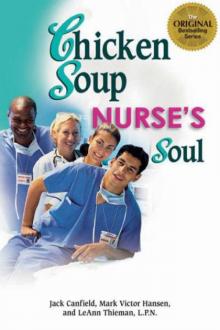 Chicken Soup for the Nurse's Soul: Second Dose
Chicken Soup for the Nurse's Soul: Second Dose Chicken Soup for the Ocean Lover's Soul
Chicken Soup for the Ocean Lover's Soul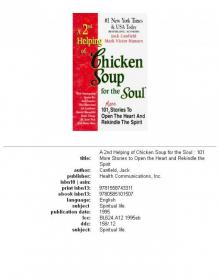 A 2nd Helping of Chicken Soup for the Soul
A 2nd Helping of Chicken Soup for the Soul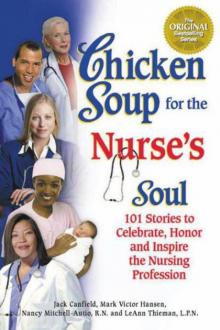 Chicken Soup for the Nurse's Soul
Chicken Soup for the Nurse's Soul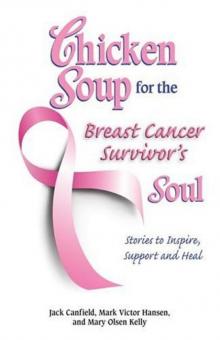 Chicken Soup for the Breast Cancer Survivor's Soul
Chicken Soup for the Breast Cancer Survivor's Soul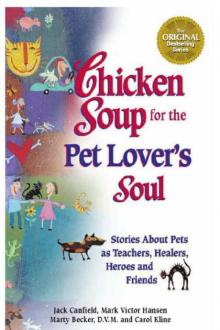 Chicken Soup for the Pet Lover's Soul
Chicken Soup for the Pet Lover's Soul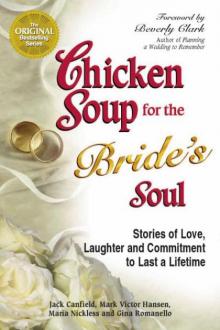 Chicken Soup for the Bride's Soul
Chicken Soup for the Bride's Soul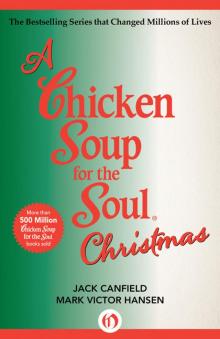 A Chicken Soup for the Soul Christmas
A Chicken Soup for the Soul Christmas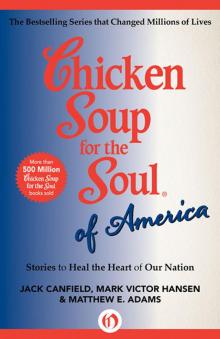 Chicken Soup for the Soul of America
Chicken Soup for the Soul of America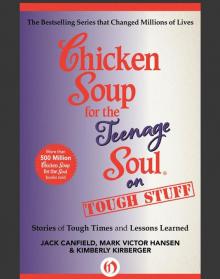 Chicken Soup for the Teenage Soul on Tough Stuff
Chicken Soup for the Teenage Soul on Tough Stuff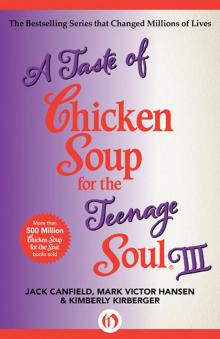 A Taste of Chicken Soup for the Teenage Soul III
A Taste of Chicken Soup for the Teenage Soul III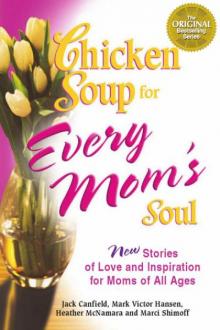 Chicken Soup for Every Mom's Soul
Chicken Soup for Every Mom's Soul Chicken Soup for the Dog Lover's Soul
Chicken Soup for the Dog Lover's Soul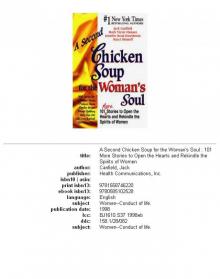 A Second Chicken Soup for the Woman's Soul
A Second Chicken Soup for the Woman's Soul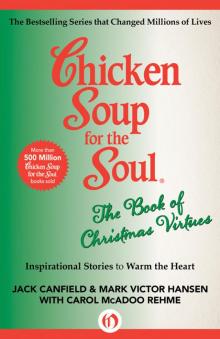 Chicken Soup for the Soul the Book of Christmas Virtues
Chicken Soup for the Soul the Book of Christmas Virtues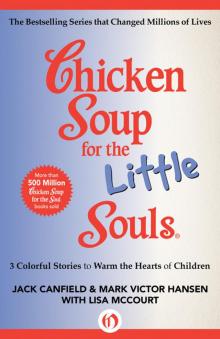 Chicken Soup for the Little Souls: 3 Colorful Stories to Warm the Hearts of Children
Chicken Soup for the Little Souls: 3 Colorful Stories to Warm the Hearts of Children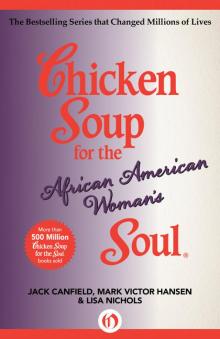 Chicken Soup for the African American Woman's Soul
Chicken Soup for the African American Woman's Soul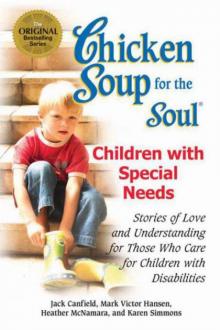 Chicken Soup for the Soul
Chicken Soup for the Soul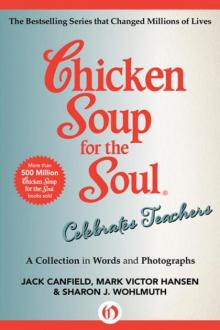 Chicken Soup for the Soul Celebrates Teachers
Chicken Soup for the Soul Celebrates Teachers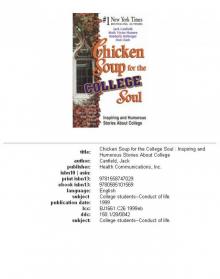 Chicken Soup for the College Soul
Chicken Soup for the College Soul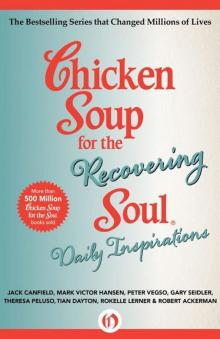 Chicken Soup for the Recovering Soul Daily Inspirations
Chicken Soup for the Recovering Soul Daily Inspirations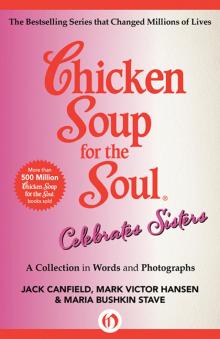 Chicken Soup for the Soul Celebrates Sisters
Chicken Soup for the Soul Celebrates Sisters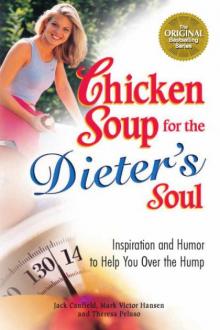 Chicken Soup for the Dieter's Soul
Chicken Soup for the Dieter's Soul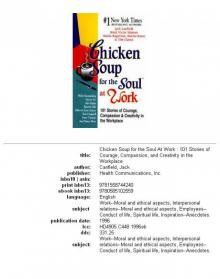 Chicken Soup for the Soul at Work 101 Stories of Courage
Chicken Soup for the Soul at Work 101 Stories of Courage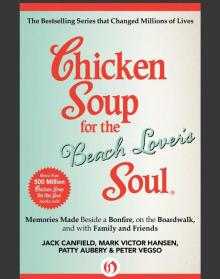 Chicken Soup for the Beach Lover's Soul
Chicken Soup for the Beach Lover's Soul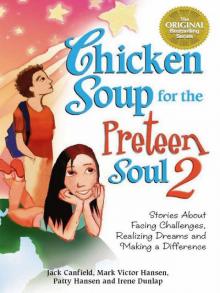 Stories About Facing Challenges, Realizing Dreams and Making a Difference
Stories About Facing Challenges, Realizing Dreams and Making a Difference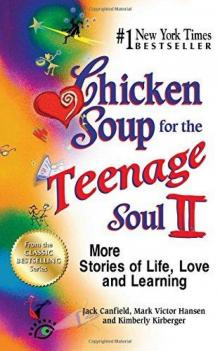 Chicken Soup for the Teenage Soul II
Chicken Soup for the Teenage Soul II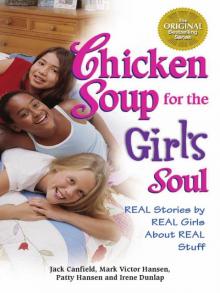 Chicken Soup for the Girl's Soul
Chicken Soup for the Girl's Soul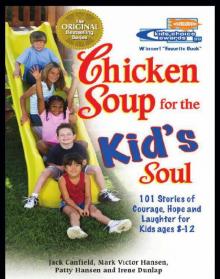 Chicken Soup for the Kid's Soul: 101 Stories of Courage, Hope and Laughter
Chicken Soup for the Kid's Soul: 101 Stories of Courage, Hope and Laughter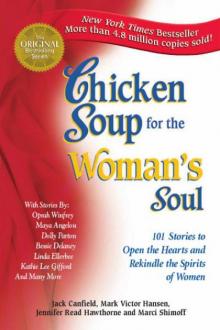 Chicken Soup for the Woman's Soul
Chicken Soup for the Woman's Soul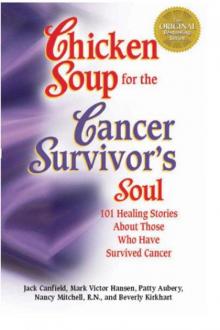 Chicken Soup for the Cancer Survivor's Soul
Chicken Soup for the Cancer Survivor's Soul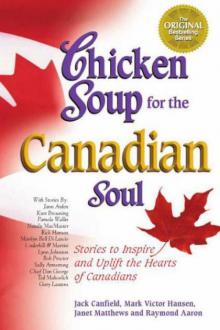 Chicken Soup for the Canadian Soul
Chicken Soup for the Canadian Soul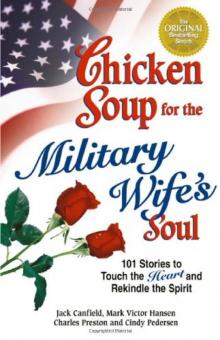 Chicken Soup for the Military Wife's Soul
Chicken Soup for the Military Wife's Soul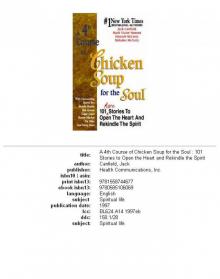 A 4th Course of Chicken Soup for the Soul
A 4th Course of Chicken Soup for the Soul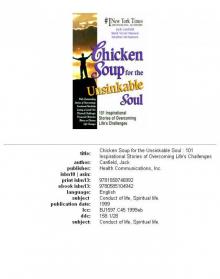 Chicken Soup Unsinkable Soul
Chicken Soup Unsinkable Soul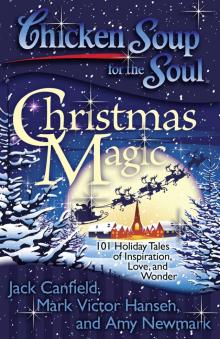 Chicken Soup for the Soul: Christmas Magic
Chicken Soup for the Soul: Christmas Magic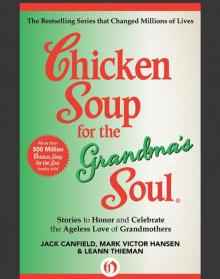 Chicken Soup for the Grandma's Soul
Chicken Soup for the Grandma's Soul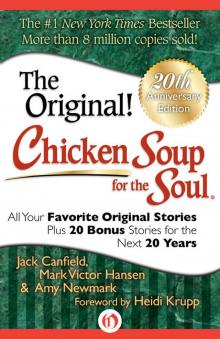 Chicken Soup for the Soul: All Your Favorite Original Stories
Chicken Soup for the Soul: All Your Favorite Original Stories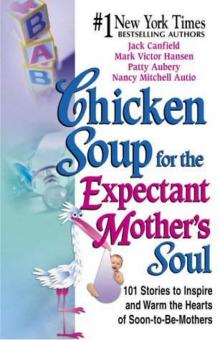 Chicken Soup for the Expectant Mother's Soul
Chicken Soup for the Expectant Mother's Soul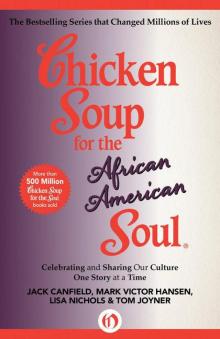 Chicken Soup for the African American Soul
Chicken Soup for the African American Soul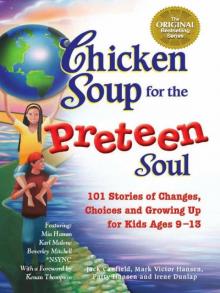 101 Stories of Changes, Choices and Growing Up for Kids Ages 9-13
101 Stories of Changes, Choices and Growing Up for Kids Ages 9-13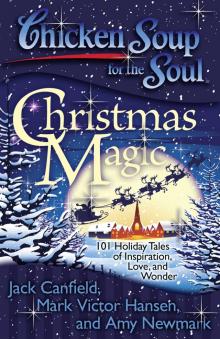 Christmas Magic
Christmas Magic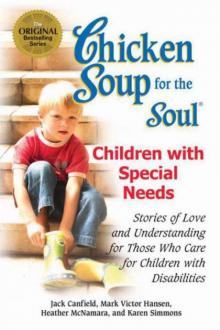 Chicken Soup for the Soul: Children with Special Needs
Chicken Soup for the Soul: Children with Special Needs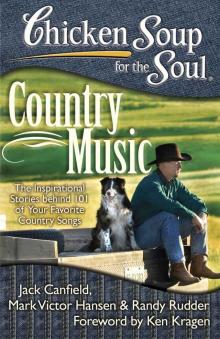 Chicken Soup for the Soul: Country Music: The Inspirational Stories behind 101 of Your Favorite Country Songs
Chicken Soup for the Soul: Country Music: The Inspirational Stories behind 101 of Your Favorite Country Songs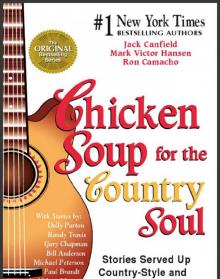 Chicken Soup for the Country Soul
Chicken Soup for the Country Soul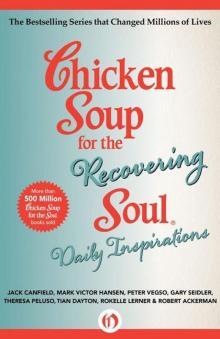 Chicken Soup for the Recovering Soul Daily Inspirations (Chicken Soup for the Soul)
Chicken Soup for the Recovering Soul Daily Inspirations (Chicken Soup for the Soul)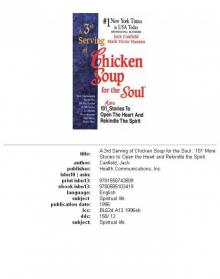 A 3rd Serving of Chicken Soup for the Soul
A 3rd Serving of Chicken Soup for the Soul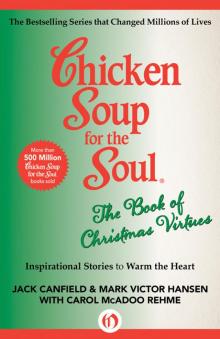 The Book of Christmas Virtues
The Book of Christmas Virtues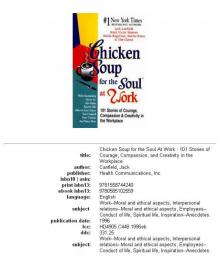 Chicken Soup for the Soul at Work
Chicken Soup for the Soul at Work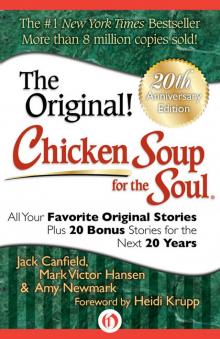 Chicken Soup for the Soul 20th Anniversary Edition
Chicken Soup for the Soul 20th Anniversary Edition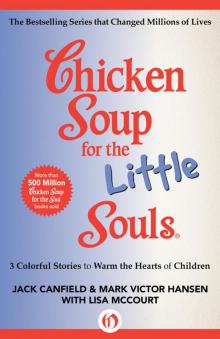 Chicken Soup for the Little Souls
Chicken Soup for the Little Souls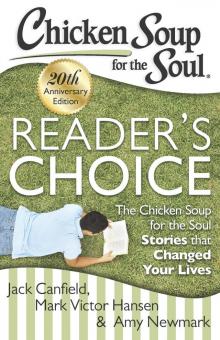 Chicken Soup for the Soul: Reader's Choice 20th Anniversary Edition
Chicken Soup for the Soul: Reader's Choice 20th Anniversary Edition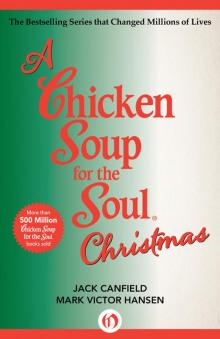 Chicken Soup for the Soul Christmas
Chicken Soup for the Soul Christmas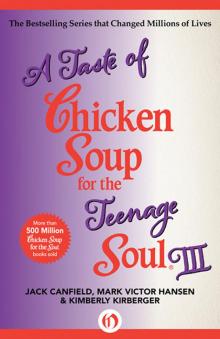 Taste of Chicken Soup for the Teenage Soul III
Taste of Chicken Soup for the Teenage Soul III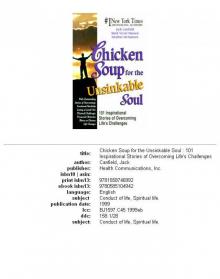 Chicken Soup for the Unsinkable Soul
Chicken Soup for the Unsinkable Soul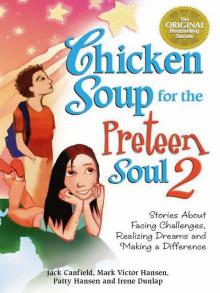 Chicken Soup for the Preteen Soul II
Chicken Soup for the Preteen Soul II